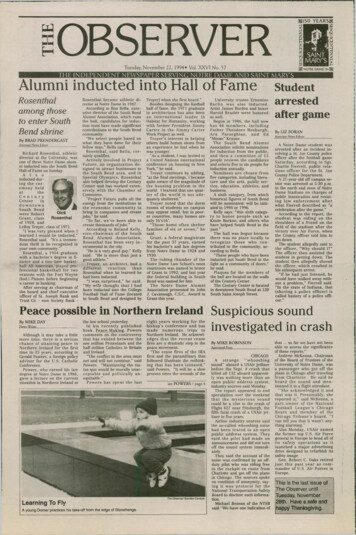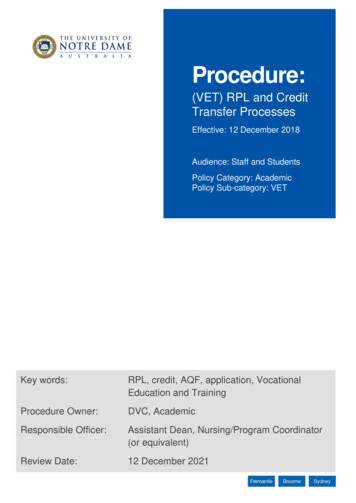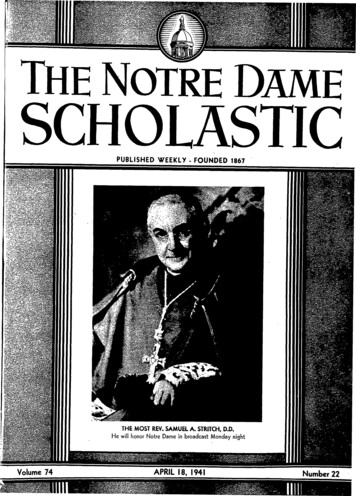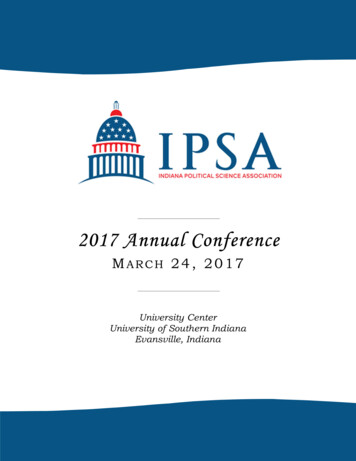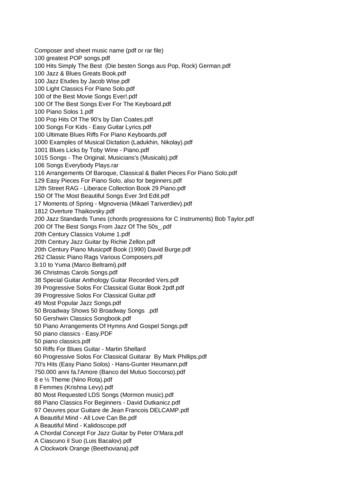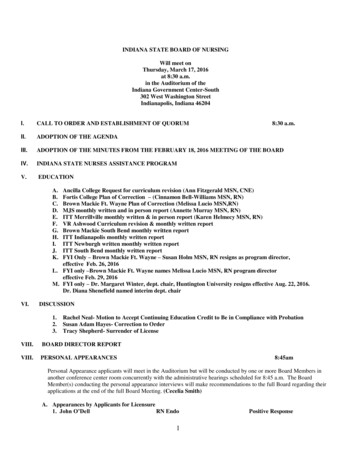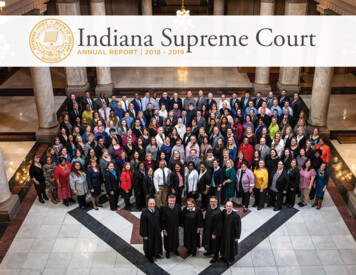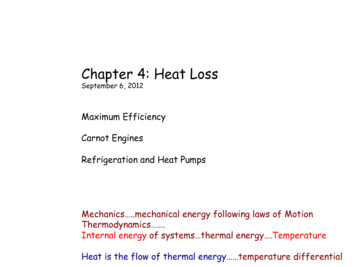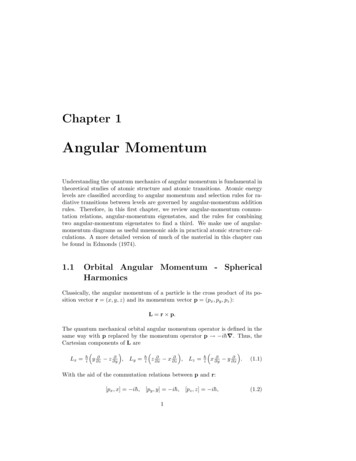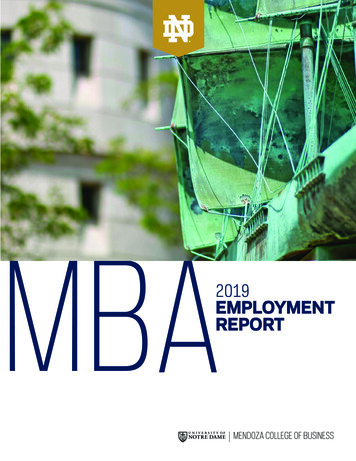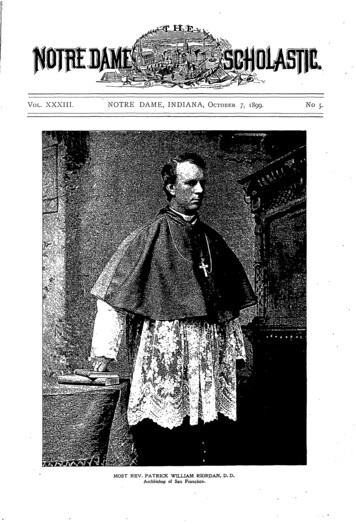
Transcription
VOL. X X X I I I .N O T R E DAME, I N D I A N A , OCTODER 7, 1899.MOST REV. PATRICK WILLIAM RIORDAN, D. D,Archbishop of San Francisco.No 5.
78NOTREDAMESCHOLASTIC.of a body of young men standing on the threshMost Rev. Archbisliop Riordan's Address.*old of active life, about to begin the greatwork of life. Looking at them I love them forthe youth,that I once had, v/hich I feel I amVERY REVEREND FATHERS, PROFESSORS ANDlosing, and for the youth which they still haveSTUDENTS OF N O T R E - D A M E :I can assure j' ou that I deeply appreciate in their possessions.My dear young men, the greatest of all giftsthis cordial welcome coming from an institution which always must be very dear to me; which God can give to anyone is the gift offor it is fortj -three years ago last month since youth, because it is filled with possibilities. ItI came here for the first time—a young student. is the only gift which comes to man butI look upon it as my Alma Matei'. My thoughts once, while other gifts may be given to manin my far-distant home on the coast frequently repeatedly. It is so great, so magnificent, sobring me,back to the happy days when I was worthy of our appreciation, that Almighty Goda student in this college; and memory brings gives it to us but once, and when it passes, it isto mind very frequently the dear lessons of gone forever. It is the spring-time of a man'swisdom that were taught me by the professors life, when he may plant the.seeds for his futureharvest; and when we do reap that harvest itnow passed away. isafter all only the planting of that which wasNotre Dame has been to me a kind andindulgent mother, and all that there is in me done in the spring months of our lives.Therefore, use well these days of your youth.that is of any good, I trace back to the germsof knowledge and Christian piety implanted Put them to good use. It is the time of discipline, in. whicii you should be careful ofin my mind and heart \yhile a student here.yourselves,and store your minds with knowlThe venerable men" that founded this institution, and with whom I was acquainted and edge that in after-years you will be able towhom I loved, have passed away. The college give out to great, advantage.,1 tell you, my young men, the great questionhas grown beyond the narrow walls -whichwere then sufiEicient to accommodate the few of today is not the question of imperialismstudents; the grounds have been enlarged and or our expansion to foreign lands; it is notbeautifiedj and when I compare the past with the question of opening up new lines of railthe present, this seems a fairy tale compared roads and harbors, of communication withwith the poor beginnings of this great college. distant lands. The great question now is:The spirit, however, -has. always been the sanie, "What kind of men are we going to have?"and the men that have passed away have And that question is to be solved by ourhanded down their spirit to those, who, in your schools and colleges! The work. that is beingday, take their places and fulfil their obligations. done here is of the most important character.For all these reasons, my dear young men, Happy are the men and the professors whothis place is very dear to me, and though I am understand their obligations — the God-eivennot yet inclined to look, upon myself as an vocation of a teacher! A n d l am glad to knowold man, I.do rank with the pioneers of Notre , that the men.gathered about me at this tableDame. I am nptVgoing to get old so long as are fully sensible' of, their responsibilities, andI can help it. There is work in youth, but there are doing their-work iii a manner creditableis no work in, old age. It' is a sad day for a ; to themselves and to those-who leave thisman when he feels his work is over; and there- college. -Happy the boys who understand thatfore we must:retain the spirit,of ourjyouth.; here they are l a y i n g t h e foundatipn of theirNow-\if I had/the'time, and if .you were in future life!-T-learnirig"to be patient, disciplined,a; mood to listen —two things requisite for a studious, and-above;all, religious. 'Let me tell yoii- npt:Jspeakihg as an archspeechTT-I would bewilling to say a few thingsman—let meto you, for my heart j s always .ready to talk to bishop/or f.as a religipus;Jb young men.; We read in the Gospel describing; v tell .ybujthat\under l/6ur,works must lie thecharacthe attitude of. our Lord towai"d:a young, maiii fouridatipri of ;a religious 1 .ter; :;y{)pn;this ipuhdatio n restthatrHe said: ''Lbbking at him if.;tlfjeyj.wpuWailljthoughSomething' of the jsanieifeeling goes through imyheartj,always5when I'stand in;the.-presehce? knowledge.;;is; a ppwer," yeti-it -Tis .pp.werless'with things within our-selye rfKnhas- *jAfter-dirinef speech to students in.- Browhsbri Hall,';no power: pyer the, mind.;; Morality is the bnlydining, rooni.: ;?; ", / i v v Vr' J'- "" . ;" : - '''. povver which guides the. will, purifies the heart,
NOTREDAMEspiritualizes the intellect. Therefore, in tryingto gather knowledge, plant in your souls theprinciples of Christian.morality.I said to your Reverend President todaywhen I came up the old familiar road knownto me over forty years ago,—I said to himthat I could recall the lessons in the ChristianDoctrine class which were given to me andto others three and forty years ago by thefounder of this institution. Not only the factthat he gave them, but the very form of hiswords, and some of the very sentences, wereso indelibly impressed upon my memory bythe magic voice of him who is gone,—thegreatest man that Notre Dame has ever known!With these few words, of thanks for yourhearty welcome, with these wishes which comefrorn my heart for your future success, I bidyou good-bye; Impossible it is for me—livingas I do in the far-distant West—to come here ;frequently; but I bear a grateful heart towardthis College which sheltered me in my youth,and laid for me, I trust, the foundation for thethings that are good in this life, and needfuland good in the life that is to be.SCHOLASTIC:79of the most successful lawyers in his state.Together with Madison he gained a notablevictory oVer Patrick Henry and Mason bywinning over the state of Virginia to adopt theFederal Constitution. On that occasion Henryremarked, that "he had the highest respectand veneration for the honorable gentleman,and that he had experienced his candor uponall occasions." Soon afterward Marshall wasappointed Attorney - General of the UnitedStates, biit he declined the office to accept aspecial .mission." to France, where he distinguished himself by gaining several victories,in diplomacy over the celebrated Talleyrand.Upon his return. he was sent to CongressMuch was expected of him in his new position,but he surpassed even the greatest expectations. His speeches were noted for theirgreat argumentative qualities. This was especially true of him in that famous debate onthe Edward Livingston resolutions, condemningthe actions of President Adams concerning t h e 'ex-tradition of Thomas Nash. "This speech,"said Judge Story, "settled then and forever, thepoints of international law upon which thecontroversy hinged." He was next appointedSecretary of State; but before the expiration ofJohn Marshall.this latter office he was chosen Chief Justice ofthe United States, and received his commissionJ A M E S F. M U R P H Y, '99.on the 31st of January, 1801. While serving inthis office he prevented Congress from overMuch of the excellence in the workings of riding the Constitution, and taught its membersthe Supreme Court of the United States was to recognize the power and independence ofeffected by John Marshall.' For many years the Suprehie Court. His labors in this hphalfhe-was Chief Justice of the United States, and called for the efforts of an able man andhe worked out many reforms. He was born in afforded the Chief Justice an opportunity to1755, in a small Virginia village called German- prove his ability.In speaking of Marshall, Mr. Binney oncetown. When.a boy, Marshall was very fond ofsports, and was never burdened with a longing said: " T h e providence of God is shown mostfor study. He was of a humorous disposition, beneficently to the world in raising up from.arid this, with his skill in many of the popular time to time and in crowning with length of:games, caused him to be looked up to by the days men of pre-emineht goodness and wisdom." His presidency as Chief Justice .lastedother boys of the community as a leader.'His first instructor was a clergyman named during.; thirty-four years of the most tryingCampbell, and among his classmates was James period in the existence of the court. No doubt,Monroe. He spent a year under this instructor, the most important opinion delivered byand after that his father undertook.to act in Marshall as Chief Justice was that "given "inthat capacity, teaching him among other things the case of Marbury'vs.' Madison. This case"mathematics, astronomy and literature. A t settled the, right of the,'Supreme Court toeighteen- he began/the study of the law, but declare null and void.any act of Congress thafbefore he was admitted to the bar he joined was coiitrary to the provisions of the Consti-.;the;army, and was in active service for about tution.": No case perhaps has had the effectfour years. On quitting the army he again* upon' the American' Government that, this 'took up the study of law at Williani and ' one had. It not only .became an underlying!Mary College. : In '1780 he'was admitted' to principle of constitutional' law. and gave;the *practice, and soon-gained areputatidn as one- judicial branch"' of: the. goveriiment a ; certain";
8oNOTREDAMEamount of independence which hitherto itdid not possess, but it had an historical significance inasmuch as it amounted to a victoryby Marshall over his old and bitter enemy,Thomas Jefferson.Marshall and Jefferson came into powerabout the same time with widely divergentviews on the subject of governmental powers.The former believed in enlarging them, whilethe latter advocated their restriction. A secondtime the Chief Justice triumphed over Jeffersonwhen in the case of Little vs. Barreme et. al.in which a naval commander, w'hile actingunder President Jefferson's orders, injured aprivate person. The court held that " Instructions not warranted by law can not legalizea trespass." This, together with the fact thatJefferson was the cause of having the sessionsof the Supreme Court suspended for over ayear, kept their enmity aglow, and in a letterto Thomas Ritchie in 1820, Jefferson in speaking of the national tribunal said:"Having found from experience that impeachment is an impracticable thing, a merescare-crow, they consider themselves securefor life; they skulk from responsibility. Anopinion is huddled up in conclave, perhaps bya majority of one, delivered as if unanimous,and with the silent acquiescence of lazy andtimid associates, by a crafty chief judge whosophisticates the law to this mind by the turnof his own reasoning."This criticism was undeserved. Marshall wasa man of great power, but his associates werealso powerful men—men that did their ownthinking. One of them, Judge Story, did moreto raise the standard of the Supreme Courtthan any other man with the exception ofMarshall. He was perhaps the greatest authority on common law that the country has everknown. Among the rest of his associates wereJohnson, Livingston, Todd and Duvall, all menof exceptional ability. And to say that thesemen were blindly.influenced and controlled byMarshall is nothing short of slander. . As a constitutional judge the Chief Justicenever had an equal. .During the thirty-fouryears that he held this office only once washe obliged to write a dissenting opinion on aquestion, of constitutionality. As stated byHampton L. Carson, in his History of theSupreme Court, "The .judgments.pjE Marshallcarried the Constitution through the experimental period and settled the question of itssupremac}-. They have remained unchanged,"unquestioned and unchallenged." , -SCHOLASTIC,In order to understand how great wasMarshall's work in reforming the workings ofthe Supreme Court one must understand inwhat condition it was at the time. Contraryto the wishes of the framers of the Constitution the judicial department of the governmentwas not considered so important and "essentialas the legislative and executive branches. Politicians deemed it a stepping-stone to higheroffices in the other departments. And oftentimes the Chief Justice would simultaneouslyhold other offices such as secretary of state, oraccept missions to foreign countries. A t onetime they were unable to hold court owing tothe fact that there was not a quorum present.At best, the court was in a very demoralizedcondition. John Jay shortly after his resignation said: " I left the bench perfectly convincedthat under a system so defective it would notobtain the energy, weight and dignity whichwas essential to its affording due supportto the national government, nor acquire thepublic confidence and respect which, as a lastresort of the justice of the nation, it shouldpossess." From this we may-infer that Mr. Jayexpected to see the legislative branch of ournational government dwindle down until itshould be totally enveloped by the otherbranches and become a mere tool and weaponof defense in their hands. H e evidently lookedforward to the men that were to take his placein office as persons that would be contented tohave other officials override them.His convictions, however, were not wellfounded, for his successor, John Marshall, succeeded in establishing the court upon a firmerbasis and in bringing about its separationfrom the other governmental branches — athing absolutely necessary to the proper administration of justice.Numerous obstacles confronted him in theperformance of this task, but he surmountedthem all, and with invincible perseverancestruggled on until he had the pleasure of seeing the Supreme Court looked up to as theguardian of the people's rights.During the last few years of his life Marshallwas by no means satisfied with the workingsof the court. H e was surrounded by a different' class of men—men with .views radicallydifferent from those held by himself. Storyand the rest of,his old associates were sroneand Marshall .\yas alone. However, he had theconsolation of knowing that the Constitutionwas above danger and that the Supreme Courthad the power to guard it. :
NOTREDAME"The King- of t h e Black Forests."HUGH S. GALLAGHER, I9OO.{Translaicd from the Gaelic.)W h e n O'Connor .was K i n g of Ireland helived in R a t h Cruachan, Connaught. H e h a donly one son who from his youth grew up wildand disobedient. O n e ' m o r n i n g he went forth,His hound at his heels,His hawk on his hand,On a beautiful black steed mounted,and h e went his way singing his favorite songuntil he came to a big hawthorn bush on theside of a glen. T h e r e an old grey man wassitting, who said:" Prince, if you can play as well as you singI should like to have a g a m e with you."T h e y o u n g prince dismounted, threw t h ebridle over a branch, and sat down. T h e oldman produced a pack of cards and asked theprince if he could play. T h e answer was " Y e s , "and a bargain was struck t h a t the loser shoulddo whatever t h e winner would demand. T h eprince won, but not wishing to impose on t h eold man he said he would not m a k e anyrequest." N e v e r fear," said t h e old man; " y o u mustask something. I never yet lost but I couldpay.""All right, then," said the prince. " T a k e theh e a d off my step-mother, and in its stead putthat of a goat for a week."" I t shall b e done," said t h e old man.T h e n the prince mounted.His hound at his heels,His hawk on his hand,and continued his hunt, never thinking of theold man till he came home. T h e r e he foundall in mourning and agitation. H e was toldb y the servants that a wizard had entered t h equeen's a p a r t m e n t and had put a goat's headon her instead of her own." By t h e hole of m y coat, this is strange,"said t h e prince. " If I were h e r e I would surelytake his head off."T h e k i n g was sorrowful, and t h e only consolation and information h e could get from hislearned advisers was that it was all a work ofwitchcraft. T h e prince never let on about hisknowledge of the affair, and next morning hewent forth again,His hound at his heels,'His hawk on his hand,On a beautiful black steed mounted,SCHOLASTIC.8tand h e never drew rein until h e was at t h ehaw-tree. T h e old man was there, and h e askedthe prince if he would have a g a m e t o d a y .T h e prince answered yes, threw t h e reins overa branch and sat down. T h e cards w e r e produced, and t h e old man asked if h e g o t whathe had won the day before." T h a t ' s all right," said t h e prince." W e will play on t h e s a m e conditions today," said t h e old m a n . ," V e r y good," was the answer.T h e y played and the prince won. A s k e d hiswish, he bethought himself awhile to selectsomething difficult, and then told t h e old manto have t h e seven-acre field near his father'scastle full next morning of cattle of differentage, color, and size." I t shall be done," said t h e old man.T h e n t h e prince mounted,His hound at his heels.His hawk on his hand,and faced homeward. T h e k i n g was still sorrowful, and there was not a doctor from F a i rH e a d to Cape Clear but was there, all to noavail.N e x t m o r n i n g t h e chief steward went o u tearly and saw t h e wonder in t h e park. Terrorstricken h e ran to t h e castle to tell w h a t h e saw. H e was ordered to get assistance to driveaway t h e cattle. This he did; but no soonerwere they out on one side b u t t h e y were inon the other. Thus it was found that t h e y were"enchanted."W h e n t h e prince saw t h e cattle h e said tohimself: " I ' l l have a n o t h e r g a m e with t h e oldman today," and h e went forth,His hound at his heels.His hawk on his hand.On his beautiful black steed mounted,and soon he was a t t h e haw-tree. T h e old manwas there, and asked him if h e would haveanother g a m e today." Of course," said t h e prince, " b u t you knowI can beat you at playing cards."" W e l l , let us play some other gam'e," saidthe old man. " Did you ever play cricket?"." I did, indeed," said t h e prince, " b u t I thinkyou are too o l d . f o r that, and besides t h e r e isno place here to play it."" If you are willing I'll g e t a place," said t h eold man. T h e prince agreed, and t h e old man t o o khim through t h e glen to a green hill. T h e r e .h e produced his e n c h a n t m e n t - r o d and p r o nounced some words n o t understood b y t h eprince, and in, a m o m e n t t h e hill opened; aiid
82NOTREDAMESCHOLASTICthey entered. They passed through several your horse to feed my young I will bring youmagnificent halls until they came to a garden farther than he would, and maybe I shall leadin which everything was exceedingly beautiful, you in the direction of him you are seeking."" You may have him and welcome," saidand at an end of this garden there was atheprince, " though sorrowful am I at partingcricket ground. A coin was tossed up, and theold man got the in-hand. Then they began, with him.""All right! I'll be here tomorrow at sunand soon the game was lost by the prince. H ewas in jeopardy. What was the .old man's wish? rise," said the eagle. Then she grasped the" I am the King of the Black Forests," was horse with her great talons and took flight.the answer, "and you must find me out within The prince ate his fill, put the bag under hisa day and twelvemonth, or if you do not, I'll head and soon was fast asleep. The eagle wasfind 3 ou out and you shall lose our head." early a-wing as she had promised and awokeThey came out the same wa3 The hill him, telling him it was time to be starting, forclosed after them, and the old man went out that there was a long journey ahead."Alas! that I have to part with my houndof sight. The prince mounted his horse,and hawk," said he.His hound af his heels,"Never fear/' said the eagle, "they'll beHis hawk on his hand,and a sorrowful man he was. That evening here when you come back.""Then he got on the eagle's back, and offthe king noticing how sad and downcast heshewent over hills and valleys, over ragingappeared, concluded that some misfortune hadbefallen him. This opinion was corroborated seas and black forests until the prince thoughtby the moaning and raving of the prince in his he was at the world's end. A t sunset shesleep. I t was bad enough that the queen had a alighted, told him to follow the path to hisgoat's head, but his sadness was increased seven- right hand side and it would take him to thefold when the prince told him his calamity. The house of a friend, adding that she had to returnro'yal counsellor was resorted to, who told the to her young. The prince did so, and ere longking that he knew nothing whatever of the he was at the house, which he entered. AnKing of the Black Forest's abode, but that he old grey man that was sitting in the cornerwas sure the wizard would insist on his bargain. .arose to greet him with " a hundred thousand There was great sorrow in the castle that day— welcomes, son of O'Connor, King of Ireland!"" I do not know you," said the prince.the queen with a goat's head and the princegoing in search of the wizard uncertain of" O h ! I knew your grandfather," said thereturn. old man. "B.ut sit down; it's likely you,are. After a week the queen's head was restored, hungry.""A,little,"r said the prince.of course, and when she heard how the goat'sThen the old man, called his servants, andhead had been put on her her hatred for theprince was bitter, and she prayed that he soon a plentiful table was set before the prince,and the old man told him to eat and drinkmight never return dead or alive.On Monday morning the young prince bade his fill, for that maybe it \yould be long tillfarewell to his father and friends, andwith his he would get the same chance, again. Thisthe prince did, and gave thanks for it, aftertravelling bag on his back he went away.which the old man informed him that he wasHis hound at his" heels,aware of his purpose, "and," said he, " g o now. His hawk on his hand,'- On his beautiful black steed mounted.to bed, and I will go through my books to see:He travelled that day till the sun was.sinking if I can find out where the King of the Blackbehind the hills and night was coming on, not Forests lives." Next morning he came to the, knowing where he.should get lodging. Seeing prince, told him' get up that there ;yas a longa wood in the distance he made forit with the, journey ahead, that:he had. to make five hunintention of spending the night-under a tree. dred .miles before noon. H e sat down at the foot; of a large tree, ojpened"That's not in m power," said the prince.his bag, and had just begun to eat .when he , ."Oh! .if you are a .good.rider I'lLgive youlooked ?up and saw a large eagle flying toward a/little [horse that will, bring .y . " -hiin.-;"--/- , r-'. .'„." r 'Ivs-: -"; .-":::.:f'\ ; l ? " After breakfast the old man had the horsevV''Do riotifeaf.me,:prince,'' said thie;.eagle, i'.I ready, told the prince, to -mount and give him .r rknow. yoii; you are the son of O'Connor,;King looserein; "and: when {h up tov.of Ireland:6 T am;a friend,;and Jf-you ;give Tr the slcy/and ;you willrs toward you fi-:v sS::5;'Sirs.1TSC TWA'':
NOTREDAMEthree swans as white as the snow. These arethe three daughters of the King of the BlackForests. One of them, the youngest, will havea green napkin in her mouth, and there isnone on earth who would take you to herfather's house but she. The horse will stopnear a lake, on whose border the swans willalight and make three young ladies of themselves and then go in to bathe. This willgive you an opportunity of getting the napkin.Then hide yourself, and when the ladies comeout two of them will again turn into swansand take wing; biit the youngest, who cannot go without her napkin, will promise to doanything whatever for the one who recoversit. Come forward then and give, it to her, andtell her that you are the son of a mighty kingand that you want her to bring you to herfather's house.The prince did everything as'directed; andwhen he told his wish the young lady seemeddispleased. She agreed, however, to take himin sight of her father's house, and at his acceptance, told him for his life not to tell her fatherthat it was she brought him so far, promisingat the same time future aid. Moreover, " pretend," she said, " that you have an almightypower of enchantment."The prince promised, and then she turnedinto a swan, and told him to get on her back.She took him over hills and through glens,over raging seas and bleak forests/never alighting till sundown, when she arrived at a little-hill opposite her father's castle. Then shebade him good-bye, promised that wheneverhe would be in trouble she would be near, andwent away. The prince made for the castle,went in, and who was the first to greet himbut the old grey man who had played thecards with him." I see you.have found me out before theend of the day and twelvemonth," he said." How long since you left home?"i'This morning. When I was getting up, Isaw a rainbow; jumped on it and slid downhere," was the answer."By my hand, you.are a wonderful athlete,"said the king." O h ! that's very little of what I can do,"said the prince." I have three jobs for you to do," said theold king, "and if you succeed- in doing themyou shall havethe choice of my three daughtersfor wife; but if you do not succeed you shalldose your, head, asi many young men beforeyou have. W e don't eat but once a; weekSCHOLASTIC.83here," he continued, " and'we" had that meal,this morning." " I care not," said the prince ," I can fast for a month."'. ""Likely you can go without sleep also," saidlthe king." Of course," said the prince.:" You will have a hard- bed tonight, then}come and see." The old king took him to a large.hawthorn, told him to get up and sleepamong the branches, and to be ready for workat the first peep.of dawn. The prince climbedup to his place of rest/ but hardly had hedropped into slumber when the young princess .came, took him to the castle, supplied himwith a room and supper, and when her fatherwas about to rise in the morning brought hfmback. At sunrise the king came and told himto come down that he might show him hisday's' work. He took him to an old castle onthe edge of a lake."Now," said he, "throw every stone of thatcastle into this lake, and have it done beforesundown this evening."Then he went away. In those days allmortar was made of lime and sand moistenedwith bullock's blood and sour butter/nilk, andon that account the stones of the castle sotightly adhered that they could not be torn,asunder by an evicting landlord's batteringram. After awhile of little success the youngprince sat down thinking what to do, when theyoung lady came up asking why he lookedso sad. H e told her what he had to do, butshe only smiled, and told him not to fearfor that she would soon make it all right.She gave him bread and wine, and then produced her wand, struck the castle-with it, and .in the twinkling of an eye every stone was in *:the bottom of the lake."Now," she said, "on your life do not tellmy father that it was I did this."At the appointed time the king eame, andexpressed astonishment at the work completed. ."Sure, man!" said the prince, " I can do, ,.anything."Thus was the king becoming more and moreinclined to believe that the prince.had great ,power. H e told him that the morrow's .work. v.would be to lift the stones again and set: the .castle afoot as he had found it in the mornings.He then went home, and the prince was told ,to go to sleep where he was the night before.,,The young princess, of course, was-still hisfriend, and moreover she came "to his aid thefollowing- day, struck the water, of the.lake with, her. wand, and at once the castle was .'up.". I
84NOTREDAME"So," said the king, when he came downthat evening, " I see you have your day's workdone.""Indeed that was not much."Then the king believed that the prince hadmore power than himself, and he said:"You have but one more work to do." Thenhe told him to go to his rest; and Finguala—that was the name of the young princess—came as usual, took him into the castle, gavehim an elegant room and everything necessary,and brought him back in the morning. At theusual time the king came to him, and tookhim to a valley where there was a large well."Now," he said, " m y grandmother lost aring in that well, and you must get it for mebefore sundown."This well was one hundred feet deep andtwenty feet in circumference; it was full tothe brim, and there was an army from hellprotecting the ring.When, the king was gone Finguala cameasking what he had to do. On hearing it shesaid:" I t is, indeed, hard; but I will do my bestto save } our life. Then she supplied the princewith the accustomed fare. She made a curlewof herself and dived into the well. Fire andsmoke and sounds like thunder soon camebursting out of it, so that one would think allHades was in battle there. After awhile thesmoke cleared, the fire went out, the thunderceased, and Finguala came up with the ring." I won the battle," she said, "but beholdthe little finger of my right hand is broken.Maybe, however, this is for the best. Whenmy father comes do not give him the ring at' once, but be bold and steadfast. He will bringyou then to select your choice, which will bein this way: My two sisters and I will be in aroom with our hands stretched out near a holein the cioor. Through this hole you will putyour hand to get your wife, which will be theone whose hand you keep a hold of till myfather opens the door. You will know me bymy broken finger.""That I will, my heart's delight, Finguala," said he. ,. Thiat
8o NOTRE DAME SCHOLASTIC, amount of independence which hitherto it did not possess, but it had an historical sig nificance inasmuch as it amounted to a victory by Marshall over his old and bitter enemy, Thomas Jefferson. Marshall and Jefferson came into power about the same time with wide
